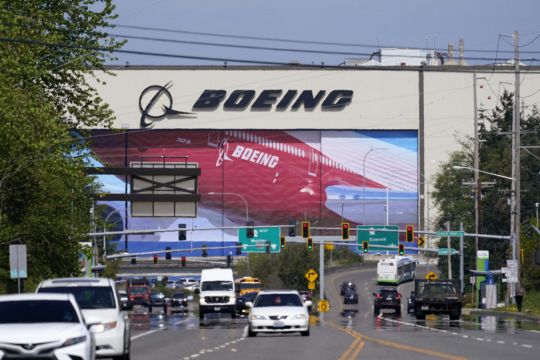Boeing reported a 4.16 billion US dollars (£3.1 billion) loss for the fourth quarter as the financial fallout of production flaws in one of its best-selling planes, the 787 Dreamliner, grew worse.
The US-based aircraft maker took a charge of 3.5 billion US dollars (£2.6 billion) to cover additional delays in delivering copies of its 787 jetliner and compensation for airlines that are still waiting to get their planes.
The company said manufacturing problems with the 787 would add two billion US dollars (£1.5 billion) in unusual production costs, double an earlier projection.
Boeing is coming off a year in which aircraft sales rebounded after a slump caused by the grounding of its 737 Max airliner and a pandemic that crippled air travel.
The Chicago-based company still finished far behind European rival Airbus in delivering new planes last year, partly because of the 787.
The two-aisle 787 was grounded for more than three months in 2013 by overheating lithium-ion batteries. After design changes, the plane became a hit with both airlines, which appreciated its fuel economy on long flights, and travellers, who liked the bigger windows and more comfortable cabin.
But in May 2021, Boeing halted deliveries of new 787s because of production flaws including gaps where panels of the carbon-composite fuselage were joined. Boeing has been unable to come up with a fix that satisfies the US Federal Aviation Administration (FAA).
Boeing’s failure to resume deliveries is causing headaches for airline customers. Without the 787s that it expected to receive by now, American Airlines has dropped some international flights planned for next summer. American Airlines officials say Boeing has agreed to pay penalties for missing deadlines, and they say there could be negotiations over additional compensation if delays continue much longer.
The 787 saga is unfolding just as Boeing tries to move past the grim early record of the 737 Max, which was grounded worldwide for nearly two years after two crashes that killed a total of 346 people.
Following a redesign that won FAA approval, Boeing delivered 245 Max jets last year, bringing in much-needed cash.
Separately, Boeing took a 402 million US dollars (£297 million) write-off for a refuelling tanker that it makes for the US Air Force. That charge pushed Boeing’s usually reliable defence and space business to a loss.
Boeing’s fourth-quarter loss compared with a loss of 8.44 billion US dollars (£6.25 billion) during the same period a year earlier, when airlines had little appetite for new planes.
Excluding one-time charges, Boeing would have lost 7.69 US dollars (£5.69) per share – worse than Wall Street expectations for a loss of 36 cents per share (27p), according to a FactSet survey.
Revenue was 14.16 billion US dollars (£10.48 billion), down 3% from a year ago, also short of analysts’ forecast of 16.54 billion US dollars (£12.25 billion).
Chief executive David Calhoun called 2021 a rebuilding year, and said in a note to staff that Boeing was “well positioned to accelerate our progress in 2022 and beyond”.
He said the airline industry’s recovery from the pandemic had spurred demand for new planes, and he expressed optimism about the long-term prospects for the 787.
Boeing shares rose about 2% in trading before the market opened on Wednesday.







